Two more tracks in my mini-tribute to the late Derek Bailey. 'Rocking Chair' and 'Stella by Starlight', both taken again from the 'Ballads' album...
Download
Rocking Chair
Stella by starlight
Buy
Thursday, December 29, 2005
Wednesday, December 28, 2005
Derek Bailey... Requiem...
I was rather hoping that it was either a hoax or a mistake – but even though the MSM don't seem to have picked up on Derek Bailey's tragic death yet - unfortunately it isn't. Here's a couple of tracks from Derek's 'Ballads' album: 'Body and Soul' and 'Georgia on my mind.' Opinion was divided somewhat when this came out - I thought it was fantastic...
Download
Body and soul
Georgia on my mind
Buy
Download
Body and soul
Georgia on my mind
Buy
Tuesday, December 27, 2005
Derek Bailey... 1/29/30 - 12/25/05... a personal appreciation...

Derek Bailey – An appreciation...
I never managed to get to a live Derek Bailey gig... which is a great hole in my aesthetic life. I had planned that in 2006 I was going to make an effort to go and see him somewhere – maybe in Barcelona where apparently he had made his home – or anywhere within geographical reason. Now – this will not happen. I first heard him on one of Charles Fox's radio three shows – 'Jazz Today' if I remember correctly, sometime back in the late 70's or very early 80's. Playing several solo pieces mainly on acoustic guitar. It was unlike anything I had ever heard – and by then I had been following the jazz avant garde for years. Maybe that was the point – that Derek (along with his cohorts in the sixties improv underground) went beyond 'jazz', 'white jazz', the tradition he came out of (passing throught the danceband and session years, the guitar vocabulary used in those areas very much rooted in the practice of jazz) and had essayed into the uncharted oceans of what he called in his superb book 'Improvisation etc' 'non-idiomatic improvisation.' As a guitar player, he had a profound effect on me and inspired my own fumbling attempts to free my playing up – I taped the show and somewhere have the old cassette – (if I can find it I'll copy it into mp3 format and put it out)– and listened to it over and over down the years.
Bailey was a formidable guitarist who, paradoxically, seems to have travelled back to the very ur-basics of music to explore the materiality of his instrument - wood and steel and the collisions of fingers and mind with these - and forwards at the same time, sending the notes spinning and skittering out into the world, conscious in the knowledge of what had gone before as he forged new sound spaces. I do not want to explore the technical side of his music too deeply here (maybe at a later date?) just to say that he was someone with wide ears and a conscious deep knowledge of the tradition – inside jazz and in the classical/serious world as well – hence the nuances of Webern, to clutch for a quick correlative.
There is a surface steely and difficult brilliance to his playing. (Maybe he was our English Cecil Taylor?) But give it the space it deserves and you can hear the depth of it: the technique certainly – whatever sounds he brought forth they were never fumbled or accidental in the execution but ring with the austere clarity of the sonorities of Thelonious Monk, say. The humour – unlike many on the avant-garde side and certainly the author of the recent book about him (a figure from the dead realms of Late Marxism it seems), he has something of the deadpan stand-up about him. The generosity - think of Company, the yearly festival he established to bring an amazing variety of players from many different disciplines together into a sprawling vibrancy in which he subsumed himself – famously saying on several occasions that he preferred playing with other musicians rather than solo – and a soloist supreme at that. Last of all – the essential integrity of the true questor. Uncompromising in days of extreme compromise musically and elsewhere and rescued from any sense of pomposity thereof and therein by the other qualities I have listed above – especially, maybe, humour. One section I remember from that old 'Jazz Today' radio shot was a 'suite' of interlinked pieces he called 'The only good jazz composer is a dead one.' Mordant and very funny.
RIP Derek Bailey...
Monday, December 26, 2005
Derek Bailey... RIP...
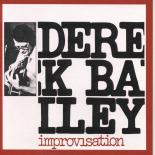
A first brief post to mourn the passing of the great avant-garde guitar player Derek Bailey – and to celebrate his work. Two tracks from the 1975 album: 'Improvisation.' Here's a great interview with Derek on Ubu Web. (This might not be working today as Ubu web have been having some problems). Another one from 1996 here...
More general information about his life and work here...
Download
M3
M9
Buy
Derek Bailey is dead...

Breaking news is that Derek Bailey, the great English improviser and guitar great has died. I discovered this via a regular surf over on 'Just for a day blog'a few minutes ago and will post more over the next few days when more information is available. A great loss and an amazing musician...
Thursday, December 22, 2005
When bop was young - part one...

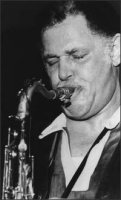
Bop was, of course, a quick hit – from the days of 78 rpm records and their inherent time restrictions. This helped to give it a compressed feel, a sprawling essence that had originally poured out on countless rehearsals, jams and all night sessions at places like Mintons – or in musicians' homes – to be taken into the studio and finely distilled into the record form of the time. I will start of this on-going sequence with some early stuff, two Dexter Gordon tracks, starting with one from 1944 with Nat Cole and Harry Edison. Dexter made the transition from swing to bop fairly quickly and easily – but these two early tracks show the 30's roots still preponderant – the second one is a fascinating mix between Buck Clayton and Bird with Dexter somewhere in the middle. Listening to this sequence, one should be able to detect the moves and jumps forward – some fluid evolution, some maybe more startling. Oo bop sh'bam... The rhythm sections show this especially – by the time Fats Navarro was recording these tracks, the drummers were playing the new rhythms essential to bop's flourishing. More asap...
Dexter Gordon:
download
I found a new baby (Los Angeles 1943: Harry Edison – Trumpet/Dexter Gordon – Tenor/Nat King Cole – Piano/Johnny Miller – Bass/Unknown – Drums).
If I had you (New York 1945: Buck Clayton – Trumpet/Charlie Parker – Alto/Dexter Gordon – Tenor/Sir Charles Thompson – piano/Danny Barker – guitar/Jimmy Butts – Bass/J.C. Heard – Drums).
Fats Navarro:
Our Delight (New York 1947: Fats Navarro – Trumpet/Ernie Henry – Alto/Charlie Rouse – Tenor/Tadd Dameron – Piano/Nelson Boyd – Bass/Shadow Wilson – Drums).
Nostalgia ( New York 1947: Fats Navarro – Trumpet/Charlie Rouse – Tenor/Tadd Dameron – Piano/Nelson Boyd – Bass/Art Blakey – Drums).
Lady Bird (New York 1948: Fats Navarro – Trumpet/Allen Eager, Wardell Gray – Tenors/Tadd Dameron – Piano/Curley Russell – Bass/Kenny Clarke – Drums/Chano Pozo – bjo?).
Dexter Gordon/Fats Navarro
The only place I have found all these tracks together is on a rather expensive set - but it's a massive collection, tending more to swing than bop but very good. (The collection I have is on an obscure label that I can't find a link for). These tracks can also be found fairly easily on Dexter and Fats (and Tadd Dameron) compilations of which there are legion... plenty of relatively cheap bebop retrospectives out there...
buy
Friday, December 16, 2005
Charles and Cecil...
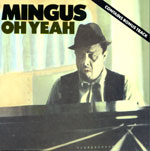
Something for the approach of the festive season – and to keep things rolling while I work on my big bebop post. Two tracks – one by Charles Mingus and one by Cecil Taylor. The Mingus is from 'Oh Yeah.' Taylor's from 'Conquistador.' Although one of my favourite tenors plays on the Mingus album – the late great Booker Ervin, all the solos on this track are by Roland Kirk, summing the pork home in a fiery display backed by high-power rifferama from Jimmy Knepper's trombone and Ervin. Mingus is on piano and what might be loosely termed 'vocals' here and on other tracks (notably 'Devil Woman') leaving Doug Watkins to the bass chores and the ever-willing Danny Richmond on drums. Hog callin' indeed. My uncle's farmyard was never like this... From 1961.
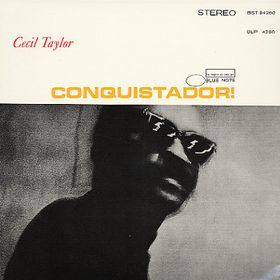
Cecil Taylor produced two great albums round about the same time (1966) for Blue Note, 'Unit Structures' and the one I'm featuring here -'Conquistador.' Both are mighty statements - this track is an alternate take not on the original album – With(Exit). Interesting to note the different strategies of the soloists – Bill Dixon fragmentary, Jimmy Lyons by now having played regularly with Taylor, using his bebop-driven technique to string longer phrases across the roiling backdrop of Taylor, Henry Grimes and Alan Silva on basses and Andrew Cyrille on drums. For downloaders – note this is a long track – 17mb plus...
This is music of blood and fire - perfect for keeping warm on a cold December day a week before Christmas...
Download
Hog Calling Blues
Buy
Download
With(Exit) Alternate take
Buy
Thursday, December 15, 2005
Arthur and Ornette...

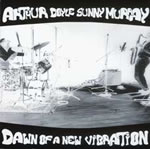
"I love being underground, man.” (Arthur Doyle).
The Arthur Doyle first (for an obscure programmatic reason that may become clearer by the end of this post...). This is Doyle with Sunny Murray recorded in Paris in 2000. Doyle re-appeared (one is almost attempted to say: from an earlier obscurity) over the last few years and is a 'character,' as it were... You can hear traces of what has gone before in his playing – but he has forged his own style – on flute as well as the tenor featured here with Murray's imperiously brilliant drumming. That 'character' speaks to people more than mere technique – there is something very idosyncratic about Doyle even in a business full of oddballs. Self-taught, he carries something of r and b and and black folkways into his work – similar to Ornette maybe, in that respect (and never forget Charlie Parker's immortalised days in the woodshed )– they both come from outside the straight jazz technical circle but Ornette has more strings to his bow (!) and is one of the dominant influences of 20th century music and beyond – like it or not. Doyle is more your second-line maverick – but still an engaging and interesting performer.
He comes in at the beginning with high register work, tentatively trying out broken phrases over the usual Murray rolling drums- those almost parade-ground figures. The line starts to extend over repeated phrases and is punctuated/polarised by high overblowing and gruff lower register work – Ben Webster with a sore throat crossed with some cross r and b sax. Some querulous notes – almost conversational – Doyle is a very 'vocalised' player. Given the fragmentary nature, the probing quality of the alto, it is left to Murray to establish the continuum of the piece – long rolling figures and splashing cymbals interspersed with sporadic thunderous bass drum work. Almost a stretched-out textbook version of bebop drumming in a curious way, as if the tight, jumpy complexities of Max and Klook et al were unrolled over a larger time-scale, freed up from the thirty two bar standard and the blues. Carrying the spatial image further - one wonders how programmatic the title 'Elephants Memories' is? The dreamy quality that ends the piece and the broken-up sax lines almost plodding across the hot savannah of the drums. Too fanciful? Maybe...
More Ornette – people seem to like his stuff more than any others I post so: here's two from a relatively obscure collection 'The Art of the Improvisers' which acts as a selection of refractions to the better-known Atlantic tracks of his early burst onto the scene. On 'Harlem's Manhattan' he also plays tenor and interestingly so. Refraction again... in a lower register it's Ornette at his best but sounding – well, deeper and different. Some wonderfully diamond-sharp drumming from Edward Blackwell – who I prefer behind him, to tell the truth. He seems to push more than Billy Higgins, good though he was. Thoughtful pocket trumpet from Don Cherry, a slow-building solo. Solid bass from Jimmy Garrison including a neat solo with some stopped guitar-like thrumming. But this is Ornette's track as he goes out on another solo that cleverly leads straight back into the unison head. One of the facets of that quartet's collective style that was so intriguing – the accuracy of the unison theme statements, delivered with bebop-like accuracy that could turn on a dime, so to speak – but moved along from bop into a different musical world.
Which brings us to 'The Legend of Bebop.' Back on alto and Charlie Haden in the bass chair. The theme contains elements of bop phrases – and earlier jazz, come to that, but beyond the head it's Ornette's world. The spatial qualities he brought to the music are on display here: his solo breathes easily at this loping tempo with some exquisite drumming from Blackwell and Haden sure and true on a walking line. Cherry delivers of another neat solo, prodded well by Blackwell. A strange theme – I had to track it back a couple of times to work out what was going on -basically, it's two twelve bar sections with a ten bar between them, an expanded blues.
Bebop blew the standard forms into further complexity, precursive to later freedoms such as Coleman's, as Parker and company ran speedily amok over the bar lines in their original themes (based usually on the blues and the 32 bar song form but under-pinned by much denser harmony) and solos. But still, at that time of forties revolution, encased by the standard forms, no matter that solos would asymetrically cross these delineations – in tandem with the drums. Which gives bop much of its tensions, after all: the turnaround is always going to come at a certain place in the line, however cunningly disguised by the piano, say, as main harmonic marker (or guitar), whatever linear teasings and stretchings the soloist is indulging in. (Although let us not forget Duke Ellington's unique compositional and performative areas that do not fit the conventional time line – there are other examples that I won't go into here, one being the playing of Art Tatum, but my argument stands up in general terms). Given the 78 rpm record that was standard up until the extended play format introduced in the fifties, one can maybe understand why there is a manic edge to many bop tracks, leaving aside any cultural/sociological explanations for the moment – everything is densely compressed to cram into the recording format and the song form. Live recordings of the time can sometimes seem less frenetic for obvious reasons of more space available – but that edge is usually still there. Possibly one way of looking at the subsequent new wave is as an overspilling (made possible on record by long players) into a new space opening up beyond the old structural. This had started fairly early on – look at Miles Davis and the 'Birth of the Cool' recordings alongside the 'cool school' so-called. But these manifestations were still from inside the camp, as it were. Leaving aside Lennie Tristano's free-form work – which never saw the light of day at the time, deemed too shocking to release (!). But all of these musicians were operating from within. Ornette came from outside... yet, despite – or because of – his self-taught status, he had a firm sense of what he was about and his place in the scheme of things. This track seems to reflect and musically document that historic move that he played a dominant part in - the cheeky title 'The Legend of...' implies that bebop existed further back in time that it actually did – Charlie Parker had only died in 1955, for example! The tune is (slyly?) boppish, albeit the odd construction noted above and Charlie Haden relies on straight walking bass as if in an echo of earler times when the bop fulcrum had shifted from bass drum to bass. But the piece is taken at a leisurely midtempo, oddly one may think in consideration of the trademark bop speediness – another ironic wave at that past freneticism?
Ornette's music always implicitly carried a sense of where it had come from as well as how far it had travelled. This can be measured in one sense by that jittery bebop quality found in his faster themes– that ends after the head as the solos plunge into a freer space, away from the perceived restrictions of the repeating chorus and harmonies. As if saying – 'Yes, I can play the old way – now listen to my new way.' The tumultuous logics of bop had after all contained much of what had gone before - much more than was realised at the time when they were similarly seen as an outrageous travesty by many critics. Looking back now at an admittedly subjective timeline that reaches from the Hot Five, say, to Bird and Diz to Ornette, or New Orleans frontline to Albert Ayler – a period of just over thirty years – it is easier to perceive the ongoing connections. A subject I hope to deal with in more detail soon – look out for 'When Bop was young!'
Arthur Doyle and Sunny Murray
Upload
Elephant's Memories 3
or
Buy
Ornette Coleman:
Upload
Harlem's Manhattan
The Legend of Bebop
Buy
Wednesday, December 07, 2005
Three by Ornette...

Prime Time Ornette...
Success... at last I have managed to upload these files, three from Ornette Coleman and his Prime Time group, taken from the album 'Tone Dialling.'
'Enter Tone Dialing, a sound experience of music in the present perception of society as it becomes an ethical civilization of all world citizens.' (Ornette Coleman, taken from the liner notes to 'Tone Dialling').
'Street Blues' starts with a funky electric guitar riff leading into Ornette floating over a back-beated, sprawling unfolding – tablas, bass, guitars. It's one of those tracks that repays repeated listenings as this music is very layered - from the drums upwards to the bass, guitars and Ornette flying over it all. When I saw him earlier this year one particular facet of his playing struck me – the manner in which he will drift slow bending phrases across a usually busy backdrop – then suddenly lock in rhythmically in a faster unison – echoes of the rapid fire hyperbebop themes he was writing way back when.
'Kathelin Gray' starts with slow, elegaic piano – of all things – not an instrument he ever featured much and indeed seemed to want to escape the verticality of - re Gerry Mulligan almost (although let us not forget that he recorded initially with Paul Bley and has used piano more recently in collaborations with Joachim Kuhn). Half of the track is out of tempo piano, supported by minimal pattering percussion until Ornette comes in and states the theme again and the musicians criss-cross behind him – a glimpse maybe of what harmolodics really means -the independence of the individual lines that create an expanded space where somehow they all resolve.
'Family Reunion' – guitar riff over busy percussion straight in – some almost unison lines and more jazzy drums than on 'Street Blues' – less straight backbeat and more rolling interspersions from Denardo coupled with a heavier cymbal presence – some smashing crash cymbal work here. The individual lines all stretch out across the mix as Ornette seems to be sharing equal sonic space, just relying on the cutting timbre of the alto to lift above the band. Towards the end, after a brief theme re-statement, some of the musicians drop out to leave Ornette soloing over some deep, swooshing bass, drums and tabla – to end abruptly.
There is a generosity in Ornette's music – the democracy of instruments he invokes and the space they have to create in. Prime Time is the electronic arm of his kingdom -the one less enjoyed by the conventional jazz critics, still ever suspicious of electricity, and is unique in sound and development. I have an odd theory that goes back to Texas music in general (Ornette is from Fort Worth). A border state indeed – where different traditions rub up against each other – and a long-standing blues tradition – exemplified by Blind Lemon Jefferson, a consummate player who could reel off riff after riff in a free-wheeling manner that ran all over the conventions of the 12 bar blues but surely in an inherently knowing way given the exemplary technique involved – maybe I'll put some of his stuff up soon. And later on, Lightnin' Hopkins, a more limited technician maybe but one who had a sure sense of his rhythms and music. Ornette comes out of that same deep blues tradition and surely this is a stream that flows into his free jazz innovations – the avant garde was always rooted more firmly in the tradition than was realised at the time. Self-taught on all his instruments, a true self-made pioneer who has the wide open spaces of Texas blowing through his music – and I also hear the vertical take in the Prime Time band that stacks up different levels of sound and genre creating an expanded hybrid that reaches out beyond jazz. Oddly enough, when I was listening to Bob Wills and the Texas Playboys years ago it came to me – the similarity. In Wills' music, you have the hee-haw vocals, the weeping wailing country hoedown of the fiddles, some almost-bebop electric guitar licks (and remember that the first revolutionary on electric guitar in jazz was Charlie Christian, another Texan), over the piano and rock solid rhythm section. They called it 'Western Swing' – an organic meld of the various popular musics of the time.
Listening to Prime Time I hear that same space and verticality – similar maybe to Miles' electric incarnations from Bitches Brew onwards in that they both tried to take on the 'Electronic Sublime' of popular music. (And replete in the irony of Miles calling Ornette 'psychotic' when you consider the trumpeter's difficult personality and behaviour - often fuelled by drugs -and the harder road Ornette travelled from Fort Worth while retaining an essential gentleness). But in Miles you hear drums, yes, and a sprawling, smudgy middle at times overlaid with his trumpet at the head. Ornette, for all his claims to democracy, is similarly the lead voice most of the time. But underneath the lines split and shimmer away, sometimes admittedly densely laying in blocks but usually having more individually defined linear movement – harmolodic, anyone?
'Tone Dialling' as a whole bears out my Bob Wills metaphor in its complex layering, coming off the quote I opened with– some kind of global manifesto about the state of music in 1995 and Ornette's willingness to let it all flow through – on other tracks he moves from Bach to funk to rap to good old free jazz and Eastern timbres. Let it all hang in or something...
Download
Streetbluesmp3
Download
Kathelin Graymp3
Download
Family Reunionmp3
Buy
Thursday, December 01, 2005
Screwups...
I have been busy these last few days but intended to put up three Ornette Coleman and Prime Time tracks nevertheless. Unfortunately, having problems with the uploading... will attempt to rectify... also have the next episode in the ongoing saga of the dear old club sporadic on Saturday upcoming and will be rehearsing and playing all day... busy busy...
Subscribe to:
Posts (Atom)

